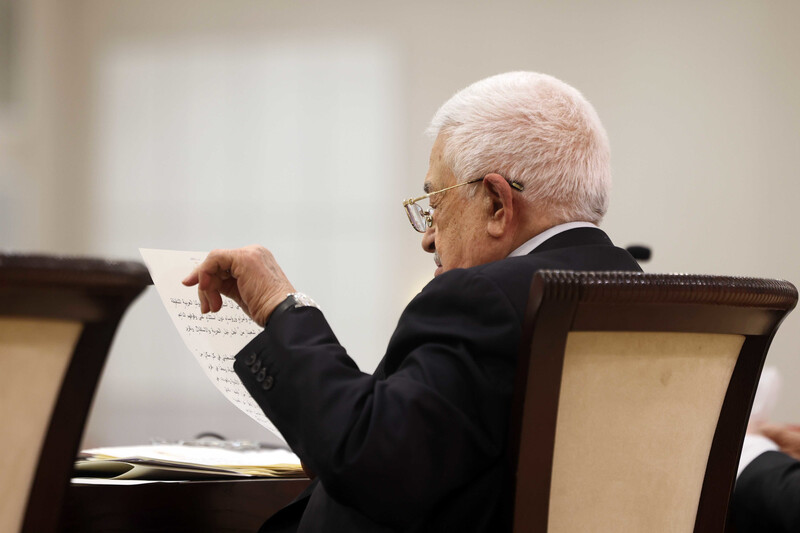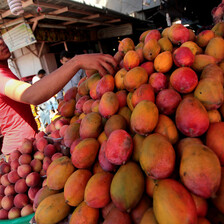The Electronic Intifada 23 May 2025

PA leader Mahmoud Abbas gives a divisive speech to the PLO’s Central Council on 23 April.
APA imagesAs Gaza faces annihilation under Israel’s relentless bombardment, a grim lesson offers no solace: surrendering to Israeli terms does not guarantee safety – a truth painfully reflected in the reality of the West Bank.
Gaza bleeds under genocide, but another wound festers within: a deepening emotional and political divide between Palestinians in Gaza and the West Bank. Many in Gaza feel abandoned — not just by the international community, but by their fellow Palestinians across the separation barriers.
The anger reached a boiling point after a televised speech by Palestinian Authority president Mahmoud Abbas, in which he seemingly referred to Hamas as “sons of dogs” and demanded they “just hand over” hostages.”
For many in Gaza, his remarks seemed aimed at all Palestinians in Gaza. This was not merely a political misstep – it was an unforgivable betrayal.
“We are being slaughtered, and he blames us?” said Ahmed al-Majdalawi, 34, an English teacher from northern Gaza. “When I saw that video, I felt as if another missile had dropped — not from an F-16, but from Ramallah.”
Al-Majdalawi’s words capture the fury simmering across Gaza. Many residents see Abbas’s remarks as shifting responsibility for Israel’s genocidal actions onto the victims themselves. On social media platforms, Palestinians from Gaza unleashed a torrent of outrage, with hashtags accusing Abbas of treason trending for days.
In small, scattered gatherings — often quickly dispersed by PA-affiliated security forces — some Palestinians in the West Bank attempted to protest Abbas’s remarks. Yet the chilling effect of years of political repression under the PA has stifled large-scale dissent.“There’s anger in the West Bank too,” says Neda al-Yaqoubi, a lecturer in education at Al-Zaytona Center for Childhood and Development in Deir al-Balah.
“But fear paralyzes many. Speaking out against the PA can cost you your job, your freedom – even your life,” referencing to the 2021 death of dissident journalist Nizar Banat in PA custody.
Widening division
The political rift between Gaza and the West Bank dates back to 2007 when Hamas assumed sole governance of Gaza following a violent confrontation in Gaza that precipitated the Fatah-Hamas split, and came about after Fatah activists refused to accept the results of the 2006 parliamentary elections that Hamas won.
Yet under the current genocidal assault, the emotional chasm has widened more tangibly than ever before.
The divergence is fueled by dramatically different daily realities. While Gazans endure total siege, continuous bombings, and humanitarian catastrophe, many in the West Bank live under occupation that, although brutal, allows for relatively greater freedom of movement, economic activity, and communication with the outside world.
The PA’s role as a subcontractor for Israeli security interests in the West Bank – arresting activists and suppressing protests in the name of maintaining “stability” – has made it complicit in the broader architecture of Israeli control.
Despite this “security coordination” – a relationship in which the PA often acts like an obedient subordinate – the situation in the West Bank remains dire.
Israel has continued to build thousands of illegal settlement units across the West Bank, consolidating its occupation and undermining prospects of Palestinian statehood.
Israeli settlers frequently attack Palestinians, with little to no intervention from Israeli authorities.
Israel also imposes a system of apartheid in the West Bank, and has withheld hundreds of millions in Palestinian tax revenues, further crippling the PA’s already fragile economy.
Israel’s occupation in the West Bank is oppressive, criminal and brutal, but without the visible, mass-casualty spectacle that characterizes Gaza’s suffering
This stark reality has reinforced a grim conclusion in Gaza: even surrendering arms and submitting to Israeli demands would not spare them from suffering and would certainly bring them no closer to liberation and statehood.
Resistance, despite its unbearable cost, remains for many the only viable option to assert Palestinian existence against a project of ongoing dispossession and genocide.
Divide and conquer
Israel’s policies have systematically entrenched these divisions over decades. The blockade of Gaza, imposed in 2007 and maintained ever since, transformed the coastal enclave into what many described as the world’s largest open-air prison.
Families have been torn apart, economies shattered and collective Palestinian identity eroded.
The fragmentation of the Palestinian people — geographically, politically and emotionally — is not incidental. It is strategic.
“Divide and conquer has always been the guiding principle,” said Nour Zein Eldien, a political science major from Al-Azhar University in Gaza. “And sadly, our own leadership in the PA has become a tool in this strategy.”
Despite the deepening divide, glimmers of solidarity persist. Independent activists, artists, and students across the West Bank continue to find ways – often digital – to express solidarity with Gaza. Online vigils, art installations, and campaigns on Instagram and TikTok have sought to breach the walls of censorship and fear.
Yet for many in Gaza, these gestures – however heartfelt – cannot erase the profound sense of abandonment.
“We don’t need just sympathy,” says Ahmad al-Majdalawi, the lecturer. “We need a real, united front — not silence, not blame.”
As Gaza buries its dead and fights for survival, the political and emotional schisms among Palestinians have become undeniable. The genocide is not just killing people; it is tearing apart the very idea of a shared Palestinian identity.
Healing this wound – if possible – will require more than political negotiations. It will demand truth, accountability and a recognition of the depth of the betrayal that so many in Gaza now carry in their hearts.
Without such reckoning, the scars left by both bombs and betrayal will endure far beyond the rubble.
Mohammad Halabi is an independent content writer.



Comments
Hderod became Rome’s tool and suffered from paranoid insanity
Permalink Leila Paul replied on
Remember how Herod killed his own children and his first wife or was it all woman around him. Herod was paranoid that his own family wanted his role as Rome’s puppet king. Now we have a contemporary version in this insane man Abbas. He is Israel rabid attack dog. He has killed and when a rabid dog kills a human it is put down. At minimum this creature Abbas needs to be caged in Israel’s prison and let the people in those prisons give Abbas a taste of the Herodian finale.
Abu Shabab
Permalink Peter Purich replied on
Abbas is the West Banks Abu Shabab. May both of them burn. Free Palestine. From the River to the Sea.
https://www.palestinechronicle...
https://www.palestinechronicle...
https://www.palestinechronicle...
Add new comment